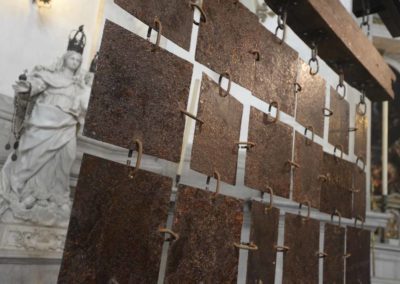
TE VEO, ME VEO – Lidia Leon
curated by Roberta Semeraro and Iris Peynado
Venice, Fondamenta Zitelle
9 May 2019 – 30 September 2019
from Wednesday to Monday 10.00 – 18.00
In the exhibition Te veo, Me veo, the artist Lidia León gives space and shape to concepts that are the foundation of human rights, establishing a correlation between two principles of ethics: freedom and equality.
The exhibition is named after an interactive installation through which León encourages visitors to recognize themselves in others, as well as to find their identity in the image reflected in the mirror.
Recognizing ourselves in others is a fundamentally ethical behaviour that allows us to gain a healthy and balanced perception of our fellows, rejecting every sort of discrimination. Besides recognizing ourselves in others, it is important to search and find beauty in the simplicity of things and in the natural course of events, accepting the cycling becoming of the world.
León, who studied architecture, quotes the Japanese architect Tadao Ando (famous among Venetians for participating in the restoration of Punta La Dogana): «Wabi Sabi is the Japanese art of searching for beauty in the imperfection and depth of nature, accepting the natural cycle of growth, decay and death. It is simple, slow and neat. It is above all authenticity».
Te veo, Me veo arises directly from cosmogony inasmuch as it recalls the cosmic egg which, in Christian-Orthodox churches, used to be hung in the apsal basin. If we consider art an unconscious language which gratifies the artist through the artistic artefact and the subsequent sublimation of content in the form and structure of the piece, Te veo, me veo is connected to the birth and re-birth of the personality of Lidia León, who retrieves her integrity as a woman and artist through the creative act. Just like an egg guards the mystery of life, the aluminium armour of the piece Te veo, Me veo conceals the mechanism of life itself, which is the union of the subject and object of knowledge.
The series Wabi Sabi, started in 2016, encourages viewers to be alert, to look beyond appearances, and to recognize the everyday beauty we are a part of.
Accepting and respecting the natural processes of decomposition and transformation of the matter is important to gain complete awareness of ourselves and of the ephemeral substance we and the world are made of. These works represent the artist’s aesthetic vision, which is based on three simple truths: nothing lasts, nothing is finished, nothing is perfect. “Wabi” is the simplicity, the freshness, the silence that can be applied to both natural and artificial objects. It can also refer to the imperfections that make things unique. “Sabi” is the beauty and serenity accompanying the advance of old age, the signs left by the passing of time. Both words express concepts of transcendence and great spirituality. With its classical forms, the Palladian church of Zitelle is the ideal place for the artist’s sincere message of comfort and hope to a world that is changing and moving in directions that are still unknown.
The Dominican artist, exhibiting in Europe for the first time, studied photography, applied arts and architecture. She was raised in a Catholic family who, for several generations, has been promoting art and culture in their country through E. León Jimenes Cultural Centre.
Immanuel Kant (whose theories in Critique of Practical Reason have been of inspiration for Lidia León) as well as other philosophers, tried to explain an apparently simple rule that the world’s intolerance and discrimination sadly tend to contradict. «Act in such a way that you treat humanity, whether in your own person or in the person of another, always at the same time as an end and never simply as a means»: with this statement, the German philosopher highlights the connection between any action and the reality in which it happens. Therefore, if we look at others and find a reflection of ourselves in them, as the artist encourages us to do, there will never be any exploitation in human relationships, but only reciprocity among individuals, for whom a regime of justice and equality will be guaranteed”.
The site of this exhibition is one of its most important element. The location of Te veo, Me veo in the church of Santa Maria della Presentazione in Venice is justified by the evangelical message of Matthew and Luke. Moreover, it is contextualized in the current politics of tolerance and integration promoted by the Church and the most progressive movements in contemporary society. As a matter of fact, it should not be forgotten that this particular church was the place of worship of the complex of Zitelle, the ancient “boarding school” that accommodated poor girls to shelter them from the misery of life.
The exhibition was organized in collaboration with the Italian Embassy in Santo Domingo in order to celebrate 120 years of diplomatic relationships between Italy and the Dominican Republic.




